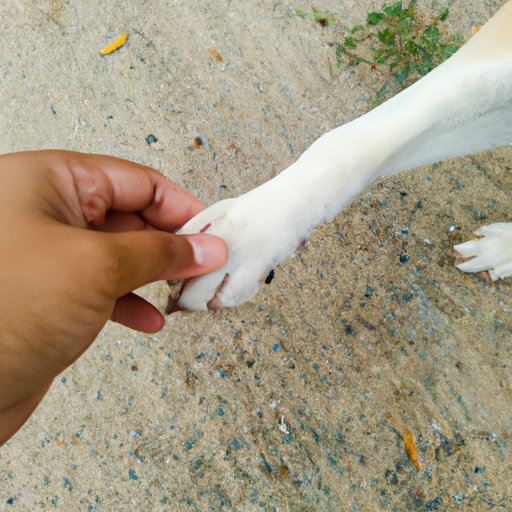
Introduction
As a dog owner, you want to ensure that your furry friend is healthy and happy. However, there are many risks associated with pet ownership that you might not be aware of, including the transmission of ringworm. Ringworm can affect both pets and humans, and it’s important to understand the risks and how to prevent it. In this article, we’ll explore everything you need to know about ringworm and how it relates to dogs.
Dog owners beware: Understanding the Risk of Ringworm Transmission from Your Canine Companions
Ringworm is a fungal infection that can affect the skin, nails, and hair of both humans and animals. It’s caused by a type of fungus called dermatophytes, which thrive in warm, humid environments. Ringworm is highly contagious and can spread from person to person, or from animal to animal. In dogs, ringworm can cause hair loss, scaly patches on the skin, and itching.
Dogs are particularly susceptible to ringworm infections because they love to explore and come into contact with other animals and their environment. Puppies, senior dogs, and those with weakened immune systems are especially vulnerable.
It’s important to note that ringworm can be transmitted from infected dogs to humans. While the infection is usually mild and self-limiting, some individuals may experience more severe symptoms like fever and blistering. People with weak immune systems, such as the elderly, young children, or those with chronic illnesses, are at a higher risk for more severe symptoms.
Exploring the Connection between Ringworm and Dogs: What Every Pet Parent Needs to Know
If you suspect that your dog has ringworm, it’s important to seek veterinary care immediately. Your vet can diagnose ringworm by taking a skin scraping and examining it under a microscope. They may also perform a fungal culture to confirm the diagnosis.
The treatment of ringworm in dogs often involves a combination of topical and oral medications. Your vet may prescribe medicated shampoos, creams or ointments, as well as oral antifungal drugs. It’s important to follow your vet’s instructions diligently to ensure that the infection is eradicated.
There are several types of ringworm that can affect dogs, including Microsporum canis, Trichophyton mentagrophytes, and Micosporum gypseum. Each type of ringworm has its own unique symptoms, but all have the potential to cause itching, hair loss, and skin inflammation.
How to Keep Your Family Safe from Ringworm Infections from Pooches
Fortunately, there are several measures you can take to prevent ringworm transmission from dogs to humans. Here are a few practical tips:
- Wash your hands frequently after handling or coming into contact with dogs, especially if they have skin lesions or patches of hair loss
- Do not allow dogs with suspected ringworm infections to interact with other animals or humans until they are declared free of the infection
- Clean all pet items such as bedding, toys, and bowls frequently
- Vacuum carpets, rugs, and floors regularly
- Wear protective gloves when grooming or cleaning up after an infected dog
It’s also important to maintain good hygiene practices for both pets and pet owners. Regular bathing and grooming can help prevent skin infections and minimize the risk of ringworm transmission. Always use pet-safe products for bathing and grooming, and avoid using human shampoos or personal hygiene products on your pets.
If you or someone in your family develops a rash or other symptoms after coming into contact with an infected dog, seek medical attention immediately. Prompt treatment can help prevent the spread of the infection and ensure a swift recovery.
Ringworm and Dogs: Separating Fact from Fiction
There are many myths and misconceptions surrounding ringworm in dogs. Here are some of the most common:
- Myth: Only outdoor dogs can get ringworm
- Myth: Ringworm is caused by a worm
- Myth: Ringworm can be cured with over-the-counter medications
It’s important to remember that ringworm is a fungal infection and is not caused by a worm at all. Over-the-counter medications are also unlikely to be effective in treating ringworm, and veterinary care is typically required for proper diagnosis and treatment.
The Ultimate Guide to Preventing Ringworm Outbreaks Caused by Dogs
Preventing ringworm outbreaks caused by dogs is essential for the health of both pets and humans. Here are some practical tips and recommendations:
- Keep your pets and their environment clean and well-groomed
- Do not allow your pets to interact with other animals that may be infected
- Consider vaccinating your pets against common infectious diseases, including ringworm
- Use pet-safe cleaning products and disinfectants to maintain a clean environment for your pets
- Seek veterinary care immediately if you suspect your pet has ringworm or any other health condition
By following these measures, you can help prevent ringworm transmission from dogs to humans, and ensure a healthy and happy life for your furry friend.
Conclusion
Ringworm is a common infectious disease that can affect both pets and humans. However, by understanding the risks and taking proactive measures, you can help prevent the spread of this fungal infection and keep your pets and family safe. If you suspect that your pet has ringworm, seek veterinary care immediately, and consider the advice offered in this guide to prevent future outbreaks. With careful attention and good hygiene practices, you can ensure the health and happiness of your beloved pets.




